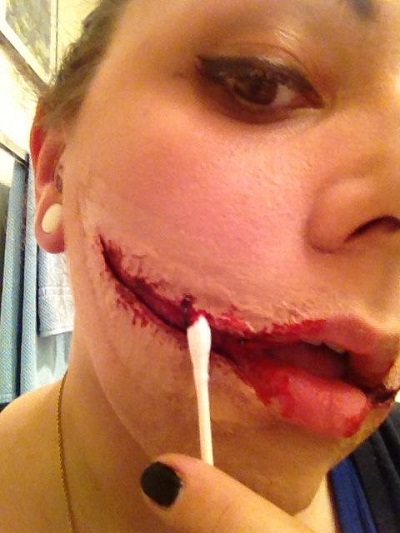FWP:
SETS == WORDPLAY
ROAD: {10,12}
This famous ghazal contains some brilliant verses, and I'm happy to have the chance to enjoy it once again. Its opening-verse offers intriguing parallels with its closing-verse, {214,12}.
The opening-verse is energized almost entirely by wordplay. Fortunately, it's based on such an obvious metaphor that we have the same one in English: we call it the 'mouth' of a wound because of the obvious physical resemblance. In the ghazal world, as Faruqi observes), the wound has a mouth 'because it resembles two red lips, and because the bone which can be glimpsed through a deep wound shows like the whiteness of teeth'.
A wound-mouth, like a real mouth, must be 'made open' in order for speech to take place. But an open wound-mouth is no guarantee of successful speech-- it's only a precondition. If someone would open a wound-mouth, only then might he be able to open 'the road of speech' with the beloved. But there's no assurance at all that this will actually occur. The verbs are in the future subjunctive, and the whole process is made to sound highly uncertain. Another 'wound-mouth' appears in {11,5x}; in {398x,7}, the wound has 'lips'.
Why is there a 'road of speech', and not just speech? An obvious wordplay reason is that a road too is something else that must be 'made open' before it's of any use, so that the same verb, vaa karnaa , works elegantly with both metaphors. And more subtly, the road provides an extra layer of complexity-- of distance to be traversed, of barriers to be overcome, of stages of progress-- that clearly evokes the sequential stages and levels of the Sufi path(s). The wound-mouth is only the beginning: it's like paying the toll that lets you onto a long, uncertain toll-road. Compare the 'road of inquiry' in {214,5}. (See also the 'foot of' discussion in {152,3}.)
On jab tak nah , see the grammatical explanation here.
Compare Mir's even more drastic M{568,4}.

Hali:
In Sufi terminology, conversation between the worshipper and the worshipped involves ranks which accomplished mystics and knowers attain. He says that conversation with the True Beloved cannot take place with this everyday mouth; rather, it is necessary to create the mouth of a wound. That is, until the heart is wounded with the sword of passion, this rank cannot be attained.
==Urdu text: Yadgar-e Ghalib, pp. 163-64